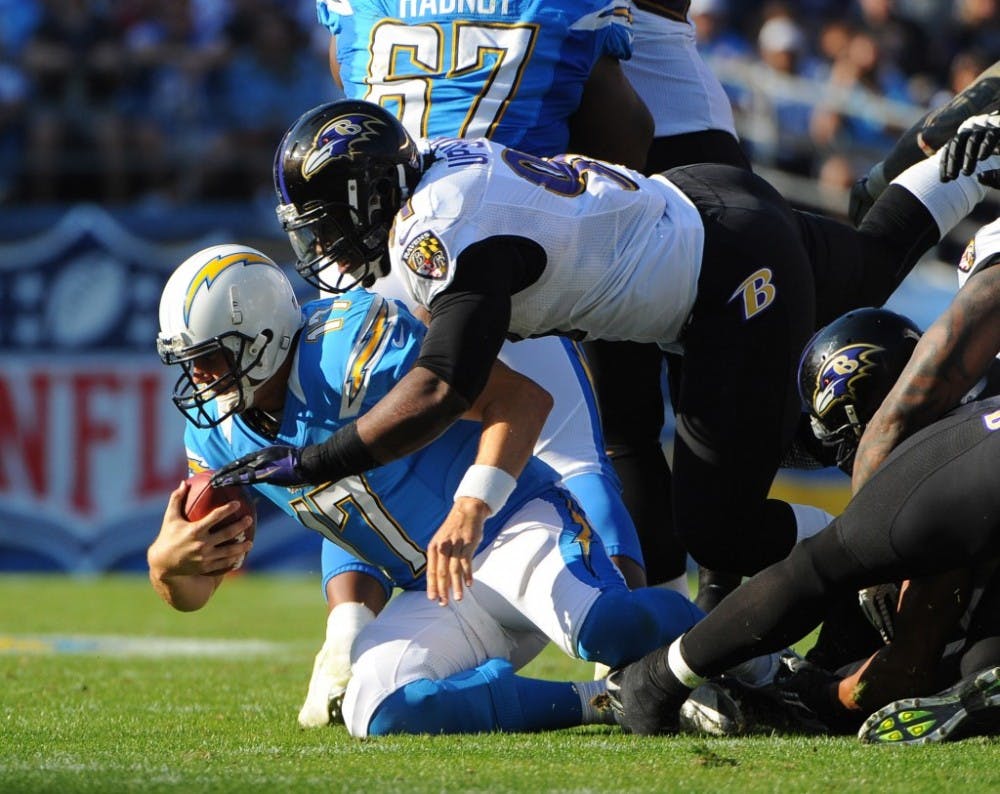In perhaps the most entertaining and compelling NFL game this season, the Denver Broncos bested the Dallas Cowboys in a 51-48 shootout thanks to performances from two quarterbacks playing near-flawless football. Peyton Manning played at his typical level, throwing for more than 400 yards and passing for four touchdowns. Tony Romo bested Manning in a statistical sense, throwing for more than 500 yards and passing for five touchdowns.
The costly interception he threw on the Cowboys final possession will be discussed on every ESPN segment imaginable until Week 6 kicks off, but before that short-lived drive, Romo carried the Dallas offense and became the only quarterback in Cowboys history to top 500 yards passing in a single game.
On that very same night, another signal caller on a Texas team broke a record. A very, very bad record.
Texans quarterback Matt Schaub became the first passer to have an interception returned for a touchdown in four consecutive games. The fourth was his first pass on Sunday Night Football, and the Houston offense never recovered against San Francisco. Schaub got benched in the fourth quarter after throwing his third interception of the night, and the Texans now face major questions about their passing attack going forward.
What makes this situation especially frustrating for Houston is everywhere else on their roster, they are talented, deep and in the prime of their playing career.
Arian Foster and Ben Tate have the Houston running game in the top ten statistically, but Foster is rapidly declining and Tate might want to go somewhere else for a shot as a starter. Duane Brown and Chris Myers are two of the best offensive lineman in the league, but Brown has been struggling with injuries this season and Myers is on the wrong side of 30. Andre Johnson will be enshrined in Canton, Ohio one day in the Hall of Fame, yet he has been rendered ineffective due to poor quarterback play.
The defense is the best in the league in yards allowed this season thanks to a healthy-for-now Brian Cushing, an emerging stud in Whitney Mercilus along with the best defensive player in the galaxy, J.J. Watt. Cushing got a fat contract extension at the start of the season, leaving Houston little cap space to keep all of their defensive standouts in the coming years.
Needless to say, the Texans window to make a Super Bowl run is now. They have all of the pieces to make that possible, except for the most important one of all: quarterback.
Since the talent level of the current roster is too good to get a high pick (and a franchise passer), Houston is in a notoriously tough spot to get out of in today’s NFL.
Rick Smith is one of the top general managers in the league, and chances are he is already laying out a blueprint to get his coveted quarterback. If Houston finishes in the high teens or low twenties in the first round of the draft, which is where they have landed the past few years, they would have a shot at grabbing a solid quarterback prospect in LSU’s Zach Mettenberger or University of Georgia’s Aaron Murray.
Mettenberger has massive upside, but lapses in accuracy and fundamentals plague him at times. Murray has the frame and skill-set of a career backup, but is accurate, well-seasoned and mature. Neither of the two are immediate solutions at the position.
Houston could also make an attempt at getting Teddy Bridgewater, who is far and away the best quarterback prospect in next year’s draft and projects to be a future pro bowler at the NFL level. To get Bridgewater, they would need to give up at least the amount Washington did in the Robert Griffin III trade, if not more. But, the Redskins made that sacrifice to brighten their future. They didn’t expect to compete for a title right away. Houston’s expectations are completely different. Texans hopefuls could point to the success of Russell Wilson to prove that the team can grab a signal caller late and keep their current pace, but Wilson is the exception, not the rule.
A trade for a veteran quarterback is Houston’s best option depending on what is available to them. If the San Diego Chargers season quickly goes south, first-year head coach Mike McCoy might take a shot in the draft to pick his own franchise passer, leaving Philip Rivers as the odd man out. If the New York Giants keep up their horrific pace, the front office might want to press restart by firing Tom Coughlin and getting rid of Eli Manning. Of course, these possibilities are purely hypothetical and unlikely in a league where the Indianapolis Colts trading a draft pick for a running back remain one of the biggest surprises of the entire season. NFL front offices are a conservative bunch, and “stay the course” remains the go-to phrase.
There is no easy way out for the Texans, who have fallen into the trap that has doomed so many NFL franchises before them. Quarterback limbo is an unforgiving place where media-friendly terms such as “ball-control offense” and “balanced football team” are used. The Alex Smith-led 49ers were this way. So were the Mark Sanchez-led Jets. We’re in an era where quarterbacks are going on transcendent playoff runs, like Joe Flacco last year and Eli Manning before him. This isn’t the 70s, the 80s or even the 90s; at some point, a quarterback has to turn on a switch to get his team that coveted Lombardi Trophy. Schaub doesn’t have that switch, and the Texans have noticed it far too late.


